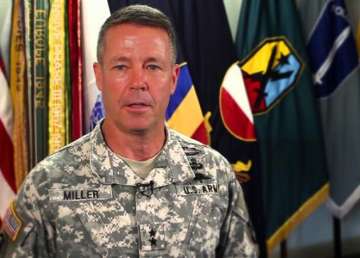Pentagon Commander says US needs to "squeeze out" safe havens from Pakistan
During the Congressional hearing, several members of the Senate Armed Services Committee expressed concern over the continued presence of terrorist safe havens in Pakistan.

The US needs to "squeeze out" safe havens from Pakistan for achieving a long-term stability in Afghanistan, a top American General nominated to head the US and NATO forces in the war-torn country said today.
Lt Gen Austin Miller in his confirmation hearing for the Commander of US and NATO forces in Afghanistan said Pakistan must be part of the solution in Afghanistan not just diplomatically but from a security standpoint as well.
"We should have high expectations that they are part of the solution," he said.
During the Congressional hearing, several members of the Senate Armed Services Committee expressed concern over the continued presence of terrorist safe havens in Pakistan.
"We have to squeeze out safe havens if we're going to be successful here," Miller said in response to a question from Senator Dan Sullivan.
"Can we ever secure our national interests, either from the train, advise and assist, or CT perspective if there is a safe haven in Pakistan?" he asked.
"A safe haven makes this infinitely more difficult," Miller said.
"I was just in Afghanistan visiting our troops and General Nicholson last month. After speaking with him, it's clear that we have made progress under the new approach. Still, we need to remain clear-eyed about Pakistan's continued support for the Taliban insurgency," said Senator Jim Inhofe.
When Senator Jack Reed asked how effective Pakistan will be in assisting the US' efforts in Afghanistan, Miller said, "As I look at Pakistan, Pakistan must be part of the solution, and we should have high expectations that they are part of the solution, not just diplomatically but from a security standpoint as well." Reed was not satisfied with the answer and said that Pakistani actions seems to be contradictory.
Miller said, "I see similar behaviour, contradictory, but as we go forward, as we work through the South Asia Strategy, not just from a military standpoint, from -- but from a diplomatic standpoint, again, I go back to I believe we ought to have very, very high expectations of them."
The US, he said, ought to have high expectations from Pakistan to address the issues like the presence of Haqqani network and safe havens.
Earlier in written submission to a series of questions to the Senate Armed Services Committee, Miller said the US looks to Pakistan to ensure that its territory is not used by terrorist groups to attack or otherwise menace neighbouring states.
"We expect Pakistan to contribute to an end to conflict in Afghanistan by exerting whatever influence it has on the Taliban to lower violence and participate in the peace process. Improved cooperation in the trade of goods and services and the movement of people will contribute greatly to our goal of stabilising Afghanistan," he said.
Pakistan's own stability and prosperity will benefit from peace in Afghanistan, he added.
Miller, however, noted that since the August 2017 announcement of the South Asia Strategy, the US has seen incremental positive changes in Pakistan's behaviour towards Afghanistan, particularly in the effort to improve its bilateral relationship with Afghan partners.
"Those changes, however, have not been decisive nor are they irreversible. We still look for conclusive evidence that Pakistan shares our vision of a secure and stable Afghanistan. Reduction in violence and Taliban sincere participation in a peace process would be indicators of progress with which Pakistan can assist," Miller said.
According to the Pentagon General, Pakistan's cooperation is vital to the success of South Asia strategy. Achieving long-term stability in Afghanistan will be difficult without Pakistan's support, but it will not be impossible, he said.
"Pakistan has made many sacrifices in the war against terrorism; its people have suffered greatly and its security forces have fought bravely.
"My understanding is that we have not yet seen these counter-terrorism efforts against anti-Pakistan militants translate into definitive actions against Afghan Taliban or Haqqani leaders residing in Pakistan," Miller said.
Unveiling his new South Asia strategy in August last year, Trump had accused Pakistan of giving "safe haven to agents of chaos, violence, and terror," and said the time had come "for Pakistan to demonstrate its commitment to civilisation, order, and to peace".